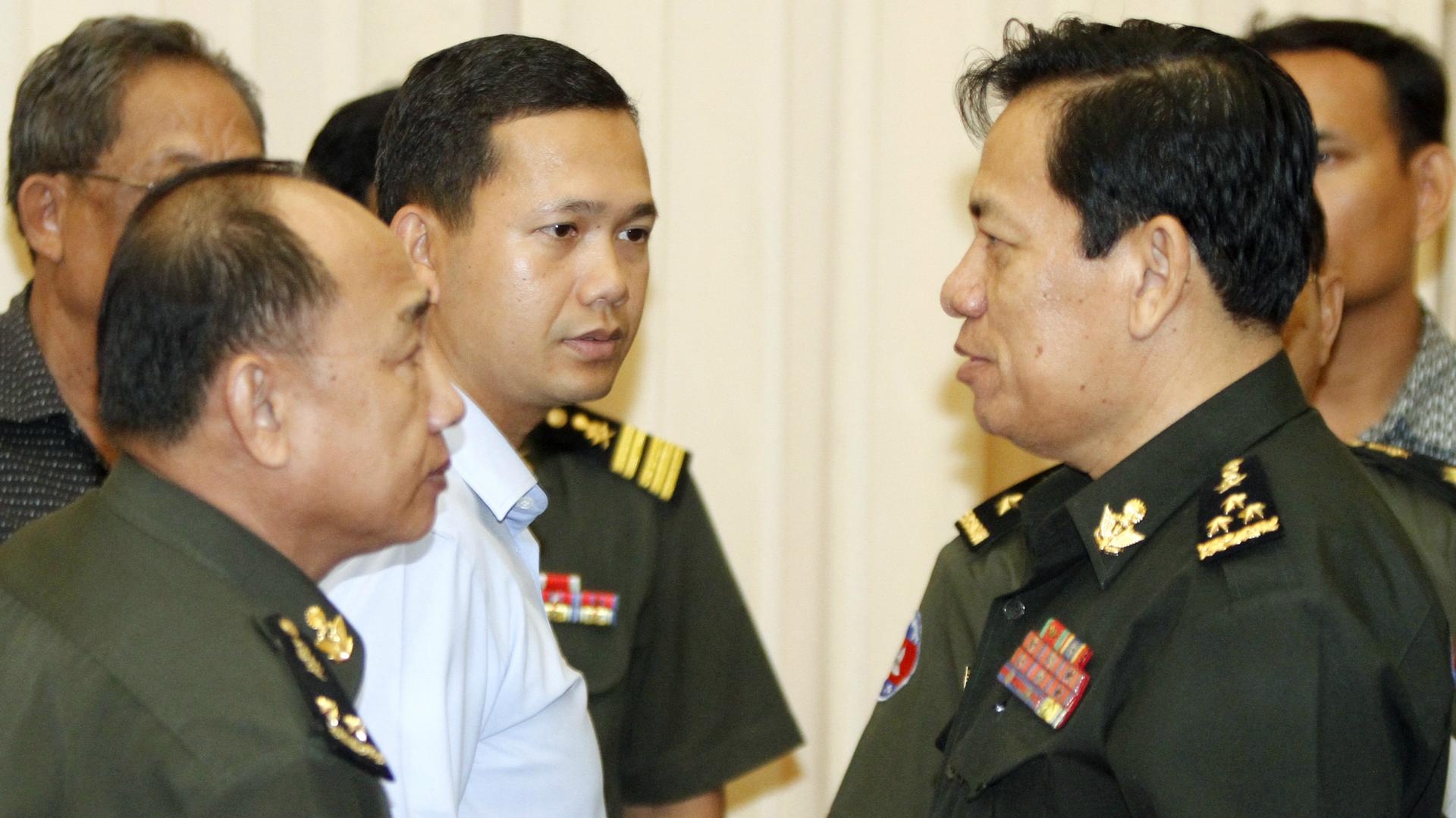Lt. Gen. Hun Manet, center, sparked a controversy in the US Khmer community when he visited Lowell, Massachusetts, in April. In this photo from 2011, he appears alongside a Cambodian Defense Ministry spokesman, right, in Phnom Penh after clashes between Thai and Cambodian soldiers on the countries' disputed border.
Last month Lowell, Massachusetts, was at the center of an international incident. The Cambodian prime minister’s son — visiting one of the largest Cambodian American communities in the nation — was told by crowds of protesters that he wasn’t welcome. Now some of those protesters say they’ve been getting retaliatory threats. It's a complicated situation with a backstory that is decades old. The fallout continues to divide people today.
The scene outside the Lowell restaurant where Cambodian Lt. Gen. Hun Manet spoke last month was raucous: Police lined the road; a helicopter buzzed overhead; protesters shouted through bullhorns and hoisted signs that accused Manet of having blood on his hands. But Manet says he doesn’t understand why anyone would say such things.
“I do not understand the real objective of the organizers,” he told the Lowell Sun’s editorial board.
Manet’s a West Point graduate and son of Cambodian Prime Minister Hun Sen, who took power after the Khmer Rouge regime killed an estimated 1.7 million people. A former Khmer Rouge commander himself, Hun Sen has been prime minister for 31 years.
Manet says that three decades later, Cambodia has a growing economy and middle class.
“People have TVs,” he told Sun editors. “Some areas have vehicles.”
Protesters, however, see a different Cambodia — one ruled by a dictator who jails dissidents and rigs elections. Champa Pagne, who demonstrated against Hun Manet in Lowell, says she had a duty to do what people in Cambodia cannot.
“I had to stand up,” she says. “I just pictured all these people in Cambodia that are still suffering and need our voice to stop — stop Hun Manet and stop Hun Sen at all costs.”
Pagne, who was born in the States, says that since the protests photos of her and other demonstrators have circulated on Facebook, their faces ominously crossed out. Pagne feels threatened; that’s why she hasn’t told her mother she was involved.
“Because it will bring so much trauma and stress,” she says. “My mother lost children in the war to Khmer Rouge. And we know who Hun Sen represents. He was Khmer Rouge. And so to tell my mother that I'm going up against Hun Sen and Hun Manet — she would die.”
Images of the genocide in Cambodia still haunt many of the survivors, but also drive them. Kamara Kay says he will not be fooled twice. He helped convince the Lowell city council to denounce Manet’s visit.
“I remember seeing bodies with a blue grocery bag wrapped around a head suffocated in a rice field and left to die,” he says. “I have to accept what I saw and appreciate what I have and continue to advocate for the better future that [there] is.”
Kay feels betrayed by Cambodian Americans who met with Hun Manet or failed to speak against him. They include the highest-ranking Cambodian American politician — Lowell state Representative Rady Mom. Kay is challenging Mom for his seat in the 18th District.
“Because he happened to be the first Cambodian elected that does not necessarily mean he truly represented the majority,” he says. “The feeling of the community is that representative Mom is a sympathizer to the regime.”
Mom says Kay and others may be using this issue for political gain. He says he simply has another point of view — an opinion he also earned by living through the genocide. As a child he worked tending to Communist Party members’ cows and lived in a refugee camp.
“I know what it's like to have no freedom,” he says. “To exist and not knowing whether you're going to live or die. But to only have fear. I know their pain and struggle.”
But unlike the protesters, Mom advocates to leave that struggle behind. He thinks Cambodia is improving, perhaps slowly, but Cambodian Americans should give it time — and leave fixing Cambodia to the people who live there.
“Cambodian politics has nothing to do with how we [live] here,” he says. “They can fight among each other. We are American.”
To Mom, being American means looking forward, and concentrating on how to make the United States a better place. To Champa Pagne, Kamara Kay and other protesters, being American means using their freedom to advocate for change, everywhere.
This story first appeared on WGBHNews.org. For more from Rupa Shenoy, check out Otherhood, a podcast about the people who came to the United States as children or are the children of immigrants.
The World is an independent newsroom. We’re not funded by billionaires; instead, we rely on readers and listeners like you. As a listener, you’re a crucial part of our team and our global community. Your support is vital to running our nonprofit newsroom, and we can’t do this work without you. Will you support The World with a gift today? Donations made between now and Dec. 31 will be matched 1:1. Thanks for investing in our work!
